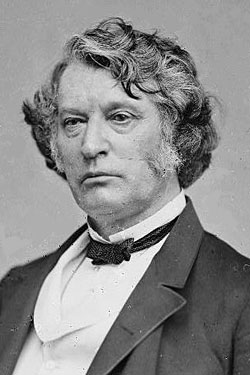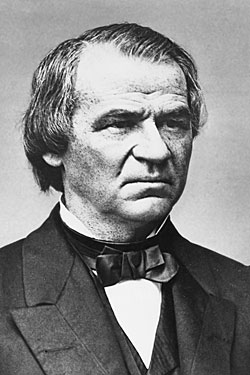Reconstruction Plans
Lincoln had proposed a plan to reconstruct the South in 1863. His plan included criminal amnesty to Confederates who lived by the federal policies and pledged allegiance to the Union. After ten percent of the voters swore allegiance to the Union, states could hold a constitutional convention and set up a state government. It didn’t yet force Southern states to give blacks the right to vote, even though they were granted their legal freedom with the abolishment of slavery and the passing of the Thirteenth Amendment.
Amendment XIII (Thirteenth Amendment)
The Thirteenth Amendment was p assed by Congress January 31, 1865, and ratified on December 6, 1865. Note: A portion of Article IV, Section 2, of the Constitution was superseded by the Thirteenth Amendment.
Section 1: Neither slavery nor involuntary servitude, except as a punishment for
crime whereof the party shall have been duly convicted, shall exist within
the United States, or any place subject to their jurisdiction.
Section 2: Congress shall have power to enforce this article by appropriate
legislation.
The Thirteenth Amendment to the Constitution had been ratified two months before the surrender at Appomattox, but Southern black Americans were not granted federally protected equal rights.
A group of Republican congressmen led by Massachusetts Senator Charles Sumner, known as the Radical Republicans, felt Lincoln’s plans were lenient and that policy should be written so that black southerners were guaranteed equality with whites.

Senator Charles Sumner
Lincoln was shot shortly after the Appomattox surrender and his vice president, Andrew Johnson, who was a Democrat and former slave owner, became president. Johnson’s reconstruction plans were more lenient than Lincoln’s. Southern states could participate in the Union and set up state governments by abolishing slavery and ratifying the Thirteenth Amendment, but no limits on voter allegiance were placed upon states under Johnson’s plan. The Radical Republicans felt that presidents should not set the legislative policy for reconstruction. Think about the checks and balances established by the Constitution. Why do you think the Radical Republicans did not want Johnson setting up policies for reconstruction?

Vice President Andrew Johnson
The Radical Republicans formed a Joint Committee on Reconstruction to draft a new reconstruction policy. Congress then refused congressional participation to the representatives from the Southern states restored under Lincoln’s and Johnson’s plans. During this time, Southern state governments enacted laws called the Black Codes to give whites control over blacks. Under the Black Codes, newly- freed black Americans could be detained and fined for being unemployed. Even women and children had to work on farms under some state codes. Under the Black Codes, curfews were established and black Americans could only rent land in rural areas. Congress passed a Civil Rights Act to outlaw the Black Codes, but Johnson vetoed it. How do you think Congress and Johnson felt about each other?